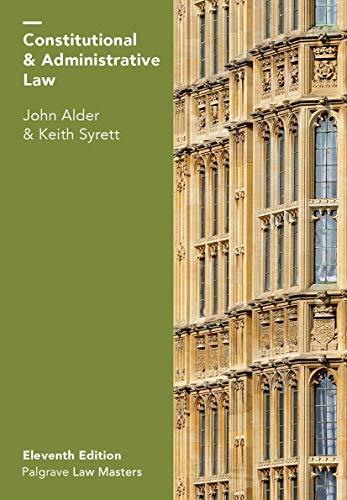Question
Multiple-choice answers for each question. Please answer only one out of three. No explanation is required. a. Under entitlement doctrine, Substantive law can provide entitlement.
Multiple-choice answers for each question.
Please answer only one out of three. No explanation is required.
a. Under entitlement doctrine,
- Substantive law can provide entitlement.
- The intent of the agency matters most.
- None of the above.
b. Which of the following is not a legal standard concerning the change allowed to be made between the proposed rule and the final rule?
- Logical outgrowth test
- Materially alter test.
- None of the above.
c. Which is not a basic requirement of informal rulemaking?
- Notice of the proposed rulemaking.
- Opportunity for public comment.
- None of the above.
d. As it concerns formal adjudication under the APA,
- Discovery is not required under the APA.
- The APA requires certain statutorily prescribed disclosures.
- None of the above.
e. Which of the below is not generally a concern of the form of rulemaking process?
- Openness and democracy.
- Politics.
- None of the above.
f. Which of the following is not a traditionally accepted liberty interest?
- Freedom from bodily restraint.
- Freedom from regulation.
- None of the above
g. Which of the following is not a basic element of due process?
- Notice.
- Opportunity to be heard.
- None of the above.
h. Concerning neutrality in the rulemaking process ...............
- Informal rulemaking does not require the same neutrality as adjudication.
- Informal rulemaking requires a high level of neutrality.
- None of the above.
i. Which of the following is not generally a factor considered in determining whether additional process is due?
- The strength of the private interest
- The risk or erroneous deprivation
- None of the above.
j.cDue to the inherent nature of confinement,
- Prisoners do maintain some liberty interest in prison.
- Prisoners forfeit all freedoms and rights upon incarceration.
- None of the above.
Step by Step Solution
There are 3 Steps involved in it
Step: 1

Get Instant Access to Expert-Tailored Solutions
See step-by-step solutions with expert insights and AI powered tools for academic success
Step: 2

Step: 3

Ace Your Homework with AI
Get the answers you need in no time with our AI-driven, step-by-step assistance
Get Started


